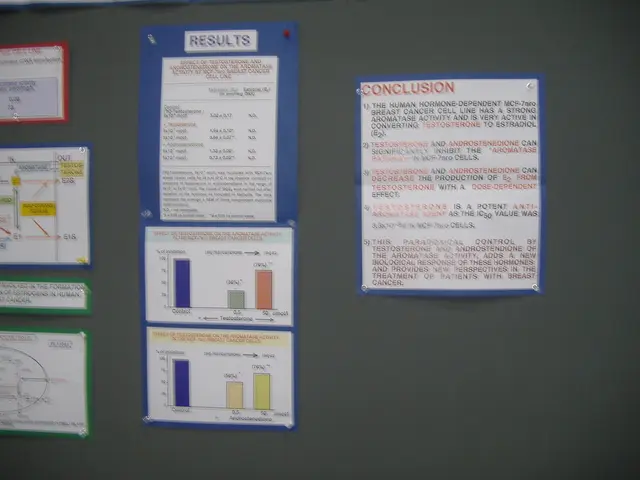Impact of Trump's Enforced Russia Sanctions Could Compel Putin's Decision-Making
In a move that could have far-reaching consequences, US President Donald Trump has threatened to impose secondary sanctions on third countries doing business with Russia. These sanctions, aimed at companies and countries importing Russian goods like oil, gas, and uranium, could lead to significant economic disruption for both Russia and global markets, as well as geopolitical tensions.
The potential economic impact on Russia and its trading partners is substantial. Countries like China, India, Turkey, and EU nations might be pressured to stop buying Russian exports to avoid steep tariffs on their exports to the US. This could lead to a major loss of revenue for Russia and difficulties in selling its oil, potentially "shutting in" global oil production due to Russia's large role in energy markets.
Global market turmoil is another concern. A collective move by Russia’s trading partners to shun its exports could cause instability in global oil markets, with disruptions and price volatility as a result. China, currently Russia's most important trading partner, accounting for around 40% of its imports and 30% of its exports, could be particularly affected.
However, some countries might attempt clandestine trading with Russia to evade sanctions. The scale of such trade, especially in oil, makes this difficult to conceal due to tanker traffic monitoring. The risk of hidden trade and enforcement challenges further complicates the situation.
The potential for recessionary effects is a serious concern. Analysts warn that secondary sanctions could not only financially strain Russia but also risk pushing the world economy into recession.
The geopolitical fallout could be significant, especially with major trading partners like China and India. Imposing such sanctions risks antagonizing these countries, potentially undermining US relations with them. European concerns also play a role, as some refined Russian products shipped to China are later sold in Europe, complicating sanction strategies.
US credibility and enforcement are also at stake. Reluctance or inconsistency in sanction enforcement diminishes US leverage and signals uncertainty to Russia and third countries. It can also embolden circumvention attempts and limit the sanctions' effectiveness in raising Russia’s costs for the war in Ukraine.
Trump's shifting rhetoric—from threatening harsh sanctions to appearing more willing to negotiate with Russia without conditions—could undermine the sanctions’ deterrence and complicate US relations with allies and rival powers.
Despite these challenges, there are signs of resilience. The Reuters news agency reported that a netting payments system, used by several sanctioned Russian banks without suffering major setbacks, has been operational for some time. US Senator Lindsey Graham and a bipartisan group of senators have prepared legislation to expand sanctions to any country importing Russian energy products.
In a surprising turn of events, the ruble appreciated roughly 40% against the US dollar since the start of the year. Many economists expect Russia's growth to be cut in half, dropping to just 2%. The German Munich-based ifo Institute predicts that after a modest uptick in 2025, Russia's economy will contract by 0.8% in 2026. The Russian central bank is expecting a slowdown, predicting between 1% and 2% growth for 2025, and 0.5% to 1.5% next year.
As the situation unfolds, it remains to be seen how Trump's threat of secondary sanctions will play out. The potential economic disruption, geopolitical tensions, and diplomatic consequences are significant, but so are the signs of resilience and adaptability. The coming months will be critical in determining the impact of these sanctions on Russia, its trading partners, and the global economy.
- The international community is closely watching the potential economic impact of US President Donald Trump's threat of secondary sanctions on countries doing business with Russia.
- Europe, being a significant trading partner for Russia, is concerned about the disruptive effects these sanctions could have on both their economies and political relations.
- The media is flooding with news about the potential recessionary effects, geopolitical fallout, and diplomatic consequences of the proposed sanctions on America, Europe, Asia, and other global markets.
- The financial industry, including banking and insurance, as well as fintech, are keeping a watchful eye on the possible economic disruption for Russia's export-oriented industries such as oil, gas, and uranium.
- War and conflicts may escalate due to the increased geopolitical tensions caused by the threatened sanctions, adding another layer of complexity to the situation.
- Policy-and-legislation makers are cautiously studying the implications of the new sanctions, balancing economic strategies with foreign policy objectives and concerns about war and conflicts.
- Energy markets, particularly those dealing in oil and gas, are poised for significant volatility as countries scramble to fill the void left by diminished Russian exports and to avoid US tariffs.
- General news agencies are assessing the resilience and adaptability of both Russia's economy and global markets in the face of the proposed sanctions, anticipating future policy developments and economic developments in the coming months.




